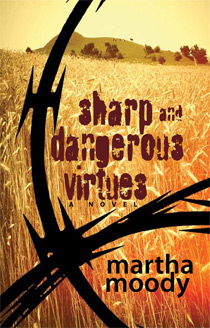
Sharp and Dangerous Virtues
It's 2047 in Dayton, Ohio. In response to food and water shortages, the U.S. government has developed a successful agricultural area—known as "the Heartland Grid"—just north of the city. The Grid and its valuable human and agricultural resources are now being threatened—or possibly, seduced—by a multinational enemy force, and all of America feels threatened, too.
Sharp and Dangerous Virtues portrays ordinary individuals caught in situations they had never planned for or even imagined. There's Tuuro, a black church custodian in flight after being accused of murder; Chad and Sharis, a married couple with two sons, holding out for normal life in their decaying suburb; Lila, Dayton's aging, lonely Commissioner of Water, who dreams of being part of the "pure" existence of the Grid residents; Charles and Diana, idealistic lovers plotting to preserve the nature center they've been trapped in.
What will these people do? What choices are left for them, and what choices have been taken away? Whom and what can they trust? Novelist Moody—known for her vivid portrayals of complicated characters and relationships in Best Friends and Sometimes Mine—weaves together cataclysmic events and the most intimate of human emotions to create a future that seems achingly real. Sharp and Dangerous Virtues will make you both think and feel.
Book Excerpt
Howard, age ten, was doing a report on America's two greatest natural wonders, the Heartland Grid and the Grand Canyon.
"The Heartland Grid's not natural, son," Chad said.
Howard gave his father an incredulous look. "It's plants," he said. "It's how America feeds the world."
North of Dayton, Ohio, where Chad and Sharis ("It rhymes with Paris," she said) Gribble and their sons, Howard and Leon, lived, there was a polymer fence close to twenty feet high, a fence that went forever, surrounding a dedicated agricultural area of over fifty thousand square miles. The Grid was roughly the shape of a nine-by-twelve casserole. Intentional villages dotted its landscape, roads crisscrossing it at ten-mile intervals.
"We never fed the world," Chad said. "We feed ourselves."
"I have pictures of the Grid," Howard said, undeterred. "Miss Bishop says her father went there. He was driving a truck and he picked up lettuces. Only one time, but he got to eat there. He said they had delicious coleslaw."
"I'm sure all their food's delicious. It couldn't be fresher."
"They won't let you spend the night. They say they have too much work."
Chad gave a noncommittal grunt. He didn't believe that too-much-work line, not for one minute. He said, "The Gridians have always been clannish."
Howard shot Chad a questioning look. "They stick together," Chad said. "They live in special towns the government built for them. They don't have visitors or talk with other people. They don't even mo-com with people who aren't them." He searched his mind for an example. "Kind of like the Johnsons"—their next-door neighbors, an older couple with a grown son.
"They're gone," Howard said.
Audio
Listen to Martha reading a selection from the manuscript: Listen on WYSO.org »
Order this Book
- hardcover :: kindle from Amazon.com
- hardcover :: nook from Barnes & Noble
- hardcover from IndieBound
- hardcover from Powell's
Book Details
Hardcover: 400 pages
Publisher: Swallow Press; first edition (October 16, 2012)
Language: English
ISBN-10: 0804011419, ISBN-13: 978-0804011419

